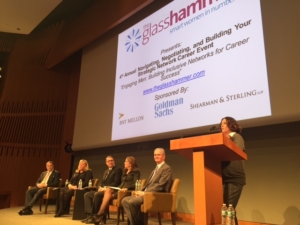 By Melissa J. Anderson (New York City)
By Melissa J. Anderson (New York City)
What is it that keeps women from ascending to executive levels in business in numbers comparable to men? It’s not for lack of commitment or ambition. It’s not a matter of skill level or about being “tough enough.” It’s not even about negative perceptions on women’s ability to turn a profit.
What it is, is bias. It’s a culture created by men and women that offers men greater opportunities to succeed, while holding women to higher standards. And now, finally, the American public is actually coming to terms with the double-standards keeping women out of leadership roles. In fact, in a recent Pew survey, the majority of respondents acknowledged that women do, in fact, face a tougher road to the top, even today.
“Americans widely believe that men have a better shot at leadership positions in business and politics, even as majorities say that men and women make equally good leaders,” the Pew report states.
In the survey, majorities (including both women and men) agreed that there aren’t many women in executive leadership because companies simply aren’t ready to hire women leaders. It was also recognized that it is because women are held to higher standards than men. Yet, respondents also said women would do just as good a job as men.
The Pew study illuminates a point of view The Glass Hammer has supported for many years. That is: women are not the ones who need changing. The reason women are not advancing into senior leadership roles in greater numbers is because they are locked out by institutional, systemic biases that favor men over women implicitly.
Yet, this runs contrary to so much of the professional advice offered to women – to do more of this or less of that, to behave more in one way or another. Lean in, lean out, be nice, be tough, always wear heels, never let them see you cry. These pieces of advice may work for some women or they may not. Many women may find power or inspiration there, while others may find them empty promises. But they will not fix the problem that persists to this day, that the corporate world is set up to give the benefit of the doubt to men over women every time when it comes to promotion and advancement.
As of January, there were only 26 female Fortune 500 CEOs, according to Pew. And it’s taken 20 years to reach that puny five percent threshold. This year’s International Women’s Day theme is “Empowering Women, Empowering Humanity: Picture it!” At this rate, what will the picture of women in leadership be in another twenty years? Is ten percent good enough?
We, as a culture, can do vastly more for women and we should. It will take work by all of us, though, and real acknowledgment from powerful business leaders – both male and female – that double standards are keeping talented, driven women from succeeding. Change starts at the top but is lived by everyone.
Double Standards by the Numbers
Looking at Pew’s numbers, it’s clear that the majority of respondents – a sample of almost 3,000 US adults – agree that women face double standards in the workplace.
Two-thirds of respondents (67 percent) said the reason there aren’t many women running major corporations is that many businesses just “aren’t ready” for to hire women for top jobs. Two in five (43 percent) said this was a “major” reason there weren’t more women in executive positions while 24 percent cited it as a “minor” reason.
Almost the same share (65 percent) of respondents said that women have to “do more to prove themselves,” and the “major” and “minor breakdowns were almost identical.
In comparison, 58 percent of respondents said they believe women’s responsibilities to their families don’t leave much time for executive leadership, with a quarter (23 percent) designating this is a “major” factor that there aren’t more women running companies, while 35 percent cited it as a “minor” factor.
Respondents were also asked to compare whether men or women are more suited toward certain characteristics. A third (34 percent) said women were better at “working out compromises,” while only 9 percent said men were better at that task. Over half (55 percent) said there was no difference between the genders here. Similarly, 31 percent said women were better at being “honest and ethical,” while three percent said men were, and 64 percent said there was no difference between the genders. Three quarters of respondents said there was no difference between the genders when it came to “negotiating deals,” while 18 percent said men were better suited to this task then women, and seven percent said women were better suited to it.
Finally, a third (34%) said men were better at being willing to take risks than women, while five percent said women were better than men at taking risks, and 58 percent said there was no difference between men and women here.
Indeed, men’s propensity for risky behavior has been studied, lauded, condemned, and questioned in equal measure.
Perhaps its time for men, who make up the vast majority of senior business leaders, to take a risk and openly support the advancement of women, by using their influence to challenge unfair workplace institutions and gender biases.


